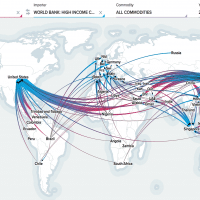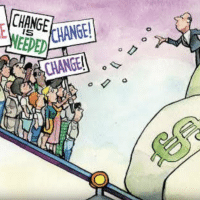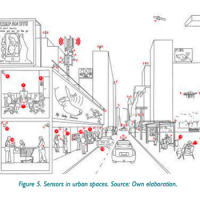-
The trouble with geoengineers “hacking the planet”
To be sure, I can actually imagine a world in which a small and strictly limited amount of albedo modification could sensibly be deployed as a complement to strong and largely successful efforts to bring carbon dioxide emissions towards zero, accompanied by successful deployment of technologies for actively removing the gas from the atmosphere. But that would be a world with a truly exceptional level of international agreement, fact-based decision-making, and cooperation towards shared goals. A world where somebody like Donald Trump can become president of a superpower is not that world.
-
Our duty to win
Organizing a strategy that is likely to win is no easy task. After all, the enemies of the working class are more powerful today than ever before; they have control over the military, the media, the courts, the politicians, and even the unions. The fight against the patriarchal capitalist system, therefore, must be strategic to be effective.
-
Imperialism still alive and kicking
With the reassertion of the dominance of finance, in the guise now of an international finance capital, the third world States have withdrawn from supporting petty producers, a process of income deflation is in full swing, and the imperialist arrangement is back in place, because of which we can see once more a tendency towards a secular decline in per capita food-grain availability in the third world as in the colonial period.
-
Capitalism is national and imperialist, not transnational
Capitalism is characterized by both centripetal and centrifugal tendencies. There is not and cannot be a transnational capitalist state and for that reason there cannot be a transnational capitalist class.
-
Finance, Crisis, and Stagnation
In this presentation Mexie begins to elaborate the theory of monopoly capitalism developed by Paul Baran and Paul Sweezy, incorporating recent theoretical development by John Bellamy Foster and Robert McChesney. Mexie has produced a number of other videos on the topic as well.
-
What is to constitute the new “yes” is the problem
For Klein, developing a meaningful anti-shock politics involves some combination of what Sanders represented and what Clinton symbolized: Sanders with respect to class and economics, Clinton as far as race and gender, and everything else. Imperialism and war scarcely enter the argument.
-
The worst of Donald Trump’s toxic agenda is lying in wait
The same theories of racial hierarchy that have been used historically to justify violent thefts in the name of building the industrial age are surging to the surface as the system of wealth and comfort they constructed starts to unravel on multiple fronts simultaneously. Trump is just one early and vicious manifestation of that unraveling. He is not alone. He won’t be the last.
-
New Perception of Imperialism
If accumulating wealth is the basic objective of capitalism, organising production using wage labour is only one of the ways it can be achieved. What finance does is to open an alternative route to reach the same objective, that is via transaction.
-
Which Countries Live Within Their (Ecological) Means?
The information contained within the 2017 edition of the National Footprint Accounts, and especially its elegant publishing platform, will be useful to critics of the status quo maintained by the major capitalist economic powers. To make sense of the data critically, however, one must go far beyond the explanation given below, as root causes are […]
-
Surveillance: The mainstream media’s dismay with the tool of coercion
The article discusses surveillance in today’s capitalist society with a reference to a recent revelation that the German intelligence agency spied upon scores of foreign journalists.
-
Why you should join the #womensstrike on International Women’s Day and form a women’s council
Something new is taking shape in the world: in more than 30 countries, people are calling for an international women’s strike on the 8th of March.
-
The Rift in the Metabolism of Nature and Society
The truth is that the environmental problems and the mounting catastrophes facing humanity have everything to do with economic and environmental injustice and a society that put the accumulation of capital before people and the planet. This is so much the case that we will increasingly see the development of an environmental proletariat where the working class broadly speaking, accounting for the greater part of humanity, will be increasingly drawn together by the need to respond to deteriorating material conditions in which the distinction between say the material conditions on the job and life conditions in general will more and more dissolve.
-
400 ppm
400 ppm In January 2015, scientists recorded atmospheric levels of carbon dioxide above 400 parts per million on a regular basis — the first time such a level had been detected so early in the calendar year. It is well established that levels of CO2 above 350 (already well above the preindustrial norm of […]
-
A Critical Reading of Steve Keen’s Debunking Economics (L’imposture économique)
Samir Amin is director of the Third World Forum in Dakar, Senegal. His books published by Monthly Review Press include The Liberal Virus, The World We Wish to See, The Law of Worldwide Value, and, most recently, The Implosion of Contemporary Capitalism. This article was translated from the French by Shane Mage. 1. Let me begin by saying that I […]
-
Man Acquitted, 30 Years Later, for “Subversive Books” on Capitalism and Revolution
This article was first published by the Hankyoreh on 25 November 2014; it is reproduced here for non-profit educational purposes.
-
It is time to know a little more about realities
I have asked the editors of Granma to relieve me of the honor of publishing what I write on the front page of the official organ of our Party, since I am thinking of expressing personal points of view on issues which, for obvious reasons of health and time, I have not been able to present in the collective leadership bodies of the Party or state, such as Party Congresses or pertinent meetings of the National Assembly of People’s Power.
-
A Response to FIFA’s “Setting the Record Straight”
On 10 June 2014 FIFA released a “Frequently Asked Questions” pamphlet “Setting the Record Straight” on what it purports to be some misconceptions about FIFA’s role and the socio-economic impact of the FIFA World Cup. The release of the pamphlet is significant as it is the first time that FIFA has been forced by […]
-
The Baran Marcuse Correspondence
Paul A. Baran and Herbert Marcuse were close, life-long friends, both of whom had been attached to the Institute for Social Research in Frankfurt in pre-Hitler Germany, and both of whom later emigrated to the United States—Marcuse to become a professor of philosophy at Brandeis University and Baran to become a professor of economics at Stanford. They corresponded frequently and met with each other when possible until Baran’s death in March 1964. -
A Critique of Heinrich’s, ‘Crisis Theory, the Law of the Tendency of the Profit Rate to Fall, and Marx’s Studies in the 1870s’
Michael Heinrich’s article is really a continuation of the argument by Monthly Review that Marx’s law of the tendency of the rate of profit to fall (LTRPF) is not the main cause of economic crises.… Heinrich makes the following points: 1) Marx’s law is indeterminate; 2) it is empirically unproven and even unjustifiable on any measure of verification; 3) Engels edited Marx’s works badly, distorting his views about the law in Capital Vol. 3; 4) Marx himself, in writings during the 1870s, began to have doubts about the law as the cause of crises and started to abandon it in favour of some theory that took into account credit, interest rates and the problem of realisation (similar to Keynesian theory); 5) Marx died before he could present these revisions of his crisis theory, so there is no coherent Marxist theory of crisis.














